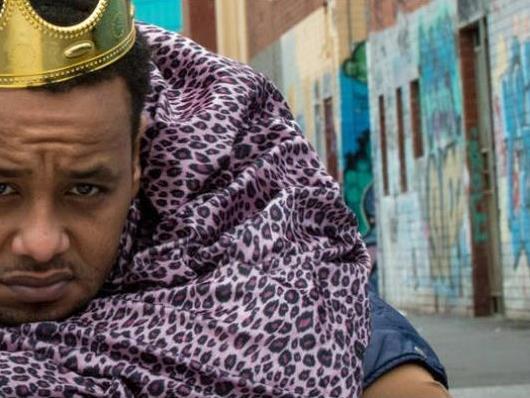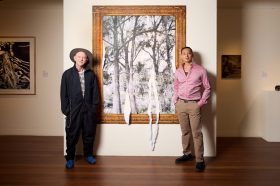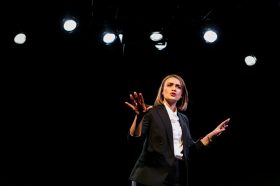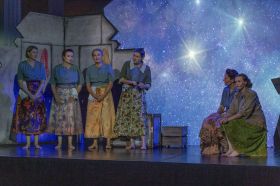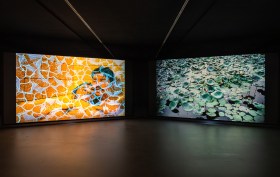Publicity image for The graceful giraffe cannot become a monkey, Big West Festival 2015.
Big West Festival, established in 1997 with the aim of addressing issues of geographic, cultural and social isolation for the residents of Melbourne’s western suburbs, today announced it would close by the end of the year.
The Board of Big West Festival unanimously decided the organisation will retire by 31 December 2016, following the completion of current projects including Mobile Art Spaces and HOUSE.
The recent crisis in arts funding sparked in May 2015 by then Minister for the Arts George Brandis is not the reason for the festival’s closure, said the Festival’s Chair Kirsty Ellem.
She said the area had evolved and now had many other options which affected the need for the festival.
‘The need for our contribution in the contemporary landscape has changed. We are excited that the West is evolving as an engaged, resilient and creative community, blessed with a wide range of organisations that deliver high quality, cutting-edge, multi-cultural and multi-artform programs,’ Ellem explained.
Read: Is your organisation past its use-by date?
‘While we acknowledge that there are current arts funding challenges, this did not determine our decision.’
The Board’s decision has been met with shock by many in the west, leading to the establishment of a new community group, Save Big West. The group will hold a public forum on 13 July to discuss the Festival’s future.
Save Big West spokesperson Hoang Tran Nguyen (who was a Big West Board member from 2013 until early 2015) said the Festival’s lack of consultation with artists, the community and other stakeholders was surprising and concerning.
‘Big West is a community-based arts organisation that’s 20 years old, so in that sense there’s real ownership of the Festival from the community. So in that sense the decision by the Board was taken without any form of consultation with that community – and for such a significant decision to be made without seeking outside advice flies in the face of what the values of a community-based arts organisation should be,’ he said.
Musician and composer Peter Knight said he was shocked by the Board’s decision to wrap up the Festival without consulting with the wider community.
‘There is no other arts festival in Melbourne’s west which aims to present work that seriously engages with contemporary art practice and reflects the multicultural vibrancy of the west. My band, Way Out West was formed in 2001 from a Big West commission to write music with Vietnamese multi-instrumentalist Dung Nguyen. The band has since toured the world many times … It would not exist without Big West. It is also only one small example of the positive, ongoing outcomes that flow from a festival like Big West. I could name many more but there just isn’t the space,’ he said.
‘I am shocked that the Board of the Big West Festival has decided to wind it up. This is a decision that has been taken without any consultation with stakeholders, which in this case consist of the community the festival serves. It has also been done without any transparent process revealing how the decision was reached. I’m sure there are financial challenges, we all face them, but if the board wasn’t up to meeting these challenges then the members should have retired and replaced themselves with people better equipped to protect this important community asset. Protecting this asset and ensuring its survival is after all the job of the board.’
Knight also accused City of Maribyrnong Council of complicity in the Festival’s demise.
‘It has become evident that the Council does not understand what an arts festival is. This is revealed in the fact that the funding for festival comes from the marketing department rather than the arts and culture department. This is a recipe for disaster because the festival is then having to justify itself as a marketing exercise rather than as an event that promotes dialogue, that builds community, that represents innovation and forward thinking, that asks questions … Council certainly has a lot to learn before it can really proudly claims its ‘Festival City’ status but councils are notoriously conservative and often myopic,’ Knight continued.
‘The real tragedy here is that the board of the festival has just given up on making the argument that art matters, and has instead thrown up its hands and chucked in the towel.’
Another arts industry source described the situation as ‘a massive failure of the imagination of the Festival’s Board, and a symptom of arts managers making “rational” decisions without the input of artists and communities’.
‘The decision was made during a period when the Festival was undertaking a strategic review prior to appointing a new artistic director. And, in a move that is familiar to artists, strategically reviewed themselves out of existence. Yes, making art is hard, and at times makes absolutely no economic sense at all. But this example of a Board sending itself out into the snow after a tough afternoon around the white board is beyond satire,’ the source said.
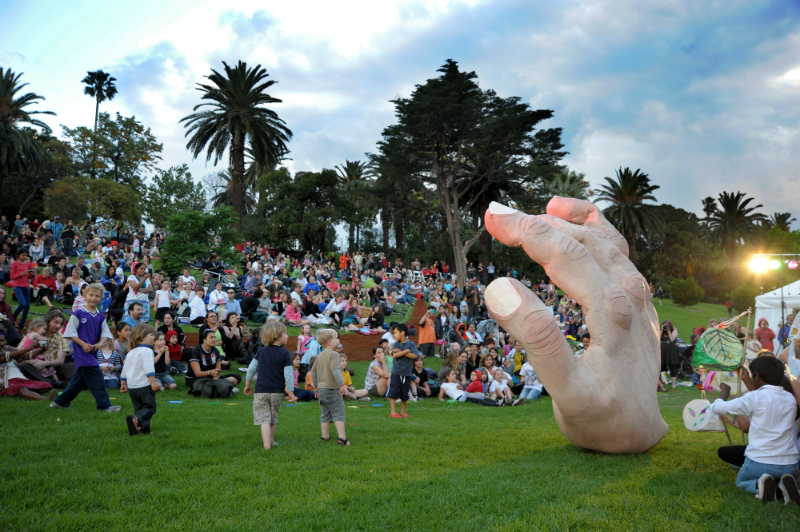
Big West Festival (2011 Opening night). Credit: Carla Gottgens
From its foundation the biennial Big West Festival helped challenge perceptions of Melbourne’s western suburbs as culturally impoverished by highlighting the region’s rich and creative culture.
That baton has since been passed to organisations such as Snuff Puppets, The Substation, and more recently 100 Story Building, who help make up the Arts West Alliance.
Read: Is the Arts West alliance the way of the future?
Community-based arts practice and engagement had been a central component of the Festival’s programming since 1997, while it also forged partnerships with many artists and organisations living and working in the western suburbs.
Director of The Substation, Brad Spolding, paid tribute to Big West and its 20 years of cultural advocacy.
‘Big West Festival for many years provided a much needed platform for artists living and working in the west to present professional work in their own community. The festival constantly challenged perceptions of the west and presented and provided the opportunity to showcase our dynamic and diverse part of Melbourne,’ he said.
‘Since its inception in 1997, Big West engaged a series of daring Artistic Directors including Donna Jackson, Steven Richardson, Jason Cross and Victoria Raywood and later Karen Hadfield who in their own individual way upped the ante each festival. Significant projects like People’s Day, the Tin Chef at Footscray Market, the Big Knit at the Stockbridge over the Maribrynong, Tamara Saulwick’s Public at Highpoint Shopping Centre and Taxi by Patricia Cornelius and Susie Dee, were for me amazing experiences and great examples of how art can truly engage with people and places to reimagine our world.’
Snuff Puppets Executive Producer, Sheah Sutton, said the company was deeply saddened by the news that Big West Festival will retire at the end of the year.
‘Big West Festival has been instrumental in developing and contributing to the exciting and diverse arts scene that continues to grow throughout the west. Its commitment to presenting strong and amazing work created with, and by, the diverse communities and artists living and working in the West was one of its greatest achievements,’ she said.
‘We are proud to have worked with Big West over the last 20 years and we believe the impact of the festival will continue to be felt in the West for many years to come.’
Big West’s Board stated their pride in the achievements of the Festival and Melbourne’s West in the last 20 years.
‘We would like to thank everyone who has helped shape Big West’s long history of supporting innovative and inclusive community-based contemporary arts and we look forward to the next vibrant chapter of arts in Melbourne’s West,’ Ellem concluded.

